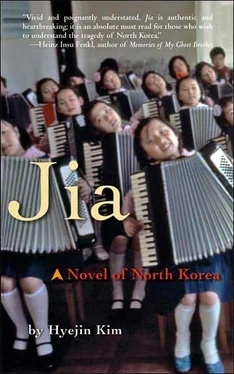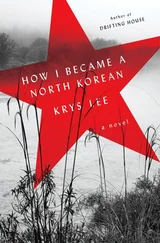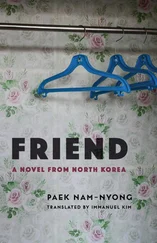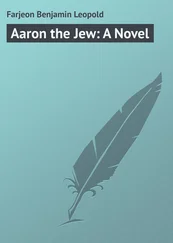A little later, Grandmother set the table. I stood up nimbly and took the dishes from her hands, asking the soldier with a smile, “Do you want some plain water or scorched rice water? I recommend my grandmother’s scorched rice water—it’s really good.” I didn’t care about my sister anymore, and I dodged her gaze.
“Thank you. Either one is fine,” he said, smiling, showing his white and well-arranged teeth.
I brought him some fairly hot scorched rice water. Grandmother always made it, boiling the leftover cooked rice, stuck in the pot, in water for a long time over a low fire. We sipped it before or after our actual meal because it made our stomachs warm and full. It was too hot to drink in one stretch, and sometimes I burned my tongue. I couldn’t understand how my grandparents could drink something so hot and then say, in a satisfied voice, “Hu! How cool it is!”
When I asked them how they could refer to such a hot drink as cool, they tried to explain. “Even though it’s hot, when it goes down along your throat and arrives at your stomach, you can feel it make your insides so clean and cool.” Seeing my dissatisfaction, they would grin and say, “You’ll understand when you grow up.”
The soldier sat at the table and wolfed down his food as we all looked on quietly. He said, “I’m taking a guerrilla training course that is supposed to last for three months. It’s my first time in these mountains—we just arrived here five days ago. When I was doing an individual exercise, I got lost.”
While the man spoke, Grandfather rolled a cigarette with thin paper he brought from the mines. “There is an army training camp,” Grandfather replied. “I know where it is. Crossing the mine is a shortcut to get there. I’ll take you over there.” He put the cigarette on the table for the stranger and made another for himself.
“Thanks. It was lucky to run into those kids. I was thinking of asking for help as soon as I saw them, but I was afraid they might be scared. So I followed them and was hesitating at the door.”
Grandfather looked at him closely. “Are you a professional soldier? You look a little old to be going through guerrilla training for the first time.”
Putting the spoon and chopsticks down on the table, he nodded slightly to my grandmother as a token of gratitude. He watched all of us and cautiously answered, “No. I’m not. I was a fisherman. Actually, I’m from South Korea.”
I could feel my grandfather’s and grandmother’s faces suddenly go stiff. And my sister grabbed my hand with such force that I yelped with pain. I didn’t know why his answer provoked such a reaction; I knew my country was called North Korea. But it seemed that I was the only one who couldn’t really figure out the meaning of what he said, and nobody explained it to me. Feeling an ache in my fingers, I cried out to my sister, “Ouch! You’re killing my fingers! Why are you doing that?”
My grandfather became animated and nervous, and he turned to Grandmother and said, “Why haven’t you cleared the table? He is already finished.”
She stood up hastily, grabbing the dishes. “Right, what am I doing? Dying is what the old do best,” she said—a typical elderly Korean response.
My sister started to help, but with a serious face Grandfather ordered us to bed. “It’s already late. Sleep!” My sister unfolded a blanket in the corner of the room, hanging her head, but still stealing glances at the soldier.
Grandfather said to the stranger, “Let me know when you want to leave.”
The man replied, with consternation, “I will not hurt your family. Anyhow, I’m in North Korea now. And I’m not trying to decamp. I’ll go back to the unit—it’ll be okay.”
The soldier and my grandparents stayed up all night, talking. I tried not to sleep, forcing my eyes open wide. I wanted to hear what they were saying. I sat next to the stranger, propped up against his knee, but my eyelids grew heavy, and at length I fell asleep there. I heard him say he had come to North Korea a year before, on a deep-sea fishing vessel. The ship was fishing close to Chinese waters; what they ran into was not abundant fish, but an armada that glittered with a strange light. More than ten Chinese soldiers boarded his ship. According to them, his ship had violated international law. All the sailors, including him, were taken to North Korea that night. There, he and his comrades were forced to attend ideology classes and military training in the mountains where we lived. During the maneuvers, he became lost.
When I opened my eyes again, it was already morning. The soldier was gone. I was lying next to my grandmother, who was about to leave for the camp. I got up in a flurry and demanded, “Where is he? Where did he go?”
“He already left. Your grandfather sent him off. But he said he’ll come back.”
I waited for the soldier for several days, but he didn’t return. He was the first visitor to our house, and his arrival had stirred a strange excitement in me; his accent was so new and curious.
Several days later, at night, he returned. As with his first visit, we heard a cautious knock at the door. I jumped for joy at seeing him again, and leaped into his arms. He smiled broadly.
He visited our house several times but never could stay long. It was strictly prohibited for him to be absent without leave. He sneaked out of his guard post and came to see us, sometimes bringing army food for my sister and me. I always cried when he left. I wasn’t sure whether I would see him again.
Whenever he visited us, my grandparents and he always discussed North Korea and South Korea. It was hard to understand what they were really saying; they spoke in such soft voices and used words I had never heard before. My grandfather never showed his feelings on his face, but it was easy to see how happy the soldier’s visits made him. Grandmother said he was about my father’s age and had a seven-year-old girl, the same age as me, in the South. Perhaps I reminded him of his daughter. He always propped me on his knee while he was in my house, checking on my studies. I took to calling him Uncle Shin, a nickname that indicated an almost familial closeness.
After several weeks, Uncle Shin said the army was leaving soon. My grandparents just nodded quietly, and we didn’t talk about his leaving that night, but the next day I began asking my grandparents if we could go with him. I remembered he said he had been in Pyongyang, the capital, and I whimpered that I wanted to go to the city and live there. They only patted my head.
The day before Shin was to leave, my grandfather called me softly, looking outside through the open door. Grandmother had taken my sister to the mountains to pick some herbs for dinner. I was sulking about being left behind.
Grandfather sat me in front of him and said, “Jia, do you want to go to school?”
I was taken aback by the sudden question, but I instantly said, “Yes.”
“Do you want to meet your mom’s parents?”
“The people wearing good clothes in the pictures? Yes, sure.” Quickly, I covered my mouth with both hands, because I was not supposed to know about the pictures. He ignored my admission and rolled a cigarette, casting his eyes down. “If you go with Uncle Shin, you can study in a nice school, meet Mom’s parents, eat very well, and have lots of toys and clothes. If you stay here with us, you can’t meet good teachers or have lots of friends. Do you want to go with him?”
“Okay.”
He seemed a bit surprised by my easy, instant reply but merely took a deep pull on his cigarette. A little later, my grandmother and sister returned empty-handed, having found no herbs.
That night, my grandmother put my clothes in a small, gray, decrepit bag. Leading me to the kitchen, she gave me my grandparents’ and my mother’s pictures. One photograph, taken when my sister was just born, showed my mother holding her infant in her arms. This picture was my sister’s most valuable possession.
Читать дальше












